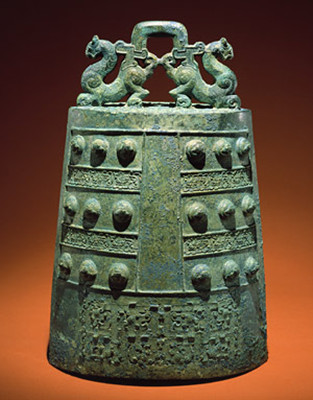Confucius himself spoke a great deal about music, and although many of his sayings on the subject have been lost, enough has survived to let us know that he saw music as playing a central part in the education of the individual-and indeed in the shaping of the state.
孔子曾多次谈及音乐,认为这是个人教育中的重要部分,也能帮助塑造一个国家。
At the core of the teachings of Confucius, was the fundamental need for every individual to understand and accept their place in the world.
孔子教育的思想核心足让每个人都了解并接受自己在社会中的位置。
It was perhaps in this spirit that sets of Chinese bells took on such philosophical importance - reflecting the diversity but also the harmony that's created when each different bell is perfectly tuned and played in its proper sequence.
也许正是这种思想,让铜钟具有了哲学意义:经调试过的铜钟依次奏响,乐声丰富而和谐。
Here's Isobel Hilton, writer and expert on modern China:
作家兼现代中国专家伊莎贝尔希尔顿解释道:
"Harmony was very important to Confucius, and the way Confucius conceived of it was that he had an idea that men could best be governed by virtue, by benevolence, by righteousness, and if the leader exemplified those virtues, then so would his people.
和是孔子思想的一个重要部分。他认为人民应该用德、仁、义来管理。如果君王能以身作则,人民自会效仿。
And by cultivating these virtues, you did away with the need for punishment and law, because you ruled by a sense of what was appropriate-and by shame. The application of all these ideas produced a harmonious society."
以这些德行来陶冶百姓,便不需要惩戒与法律。羞耻心和是非观足以治国。如果这些理念都得以实施,自然就能创造出和谐社会。
So a harmonious society is the consequence of virtuous individuals working together in a complementary way.
和谐社会是德行高尚的群众共同努力、互相补足的结果。
It's a short step for a philosopher to see, in a set of highly tuned, graduated bells, a metaphor for this ideal society-everyone in their allotted place, making music with their fellows.
哲学家很容易从这些音阶分明、乐声和谐的铜钟里看出理想社会的隐喻。每个人都应各司其职,与大家通力合作。













